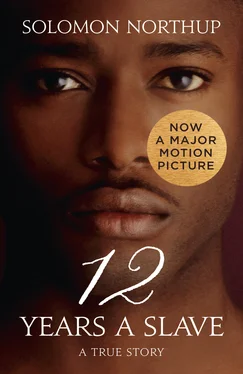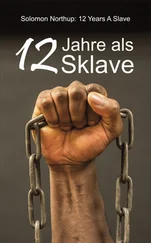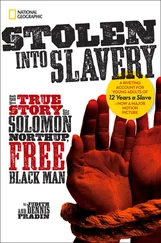At length, one day, while we were in the yard, Freeman came out and ordered us to our places, in the great room. A gentleman was waiting for us as we entered, and inasmuch as he will be often mentioned in the progress of this narrative, a description of his personal appearance, and my estimation of his character, at first sight, may not be out of place.
He was a man above the ordinary height, somewhat bent and stooping forward. He was a good-looking man, and appeared to have reached about the middle age of life. There was nothing repulsive in his presence; but on the other hand, there was something cheerful and attractive in his face, and in his tone of voice. The finer elements were all kindly mingled in his breast, as anyone could see. He moved about among us, asking many questions, as to what we could do, and what labor we had been accustomed to; if we thought we would like to live with him, and would be good boys if he would buy us, and other interrogatories of like character.
After some further inspection, and conversation touching prices, he finally offered Freeman one thousand dollars for me, nine hundred for Harry, and seven hundred for Eliza. Whether the smallpox had depreciated our value, or from what cause Freeman had concluded to fall five hundred dollars from the price I was before held at, I cannot say. At any rate, after a little shrewd reflection, he announced his acceptance of the offer.
As soon as Eliza heard it, she was in an agony again. By this time she had become haggard and hollow-eyed with sickness and with sorrow. It would be a relief if I could consistently pass over in silence the scene that now ensued. It recalls memories more mournful and affecting than any language can portray. I have seen mothers kissing for the last time the faces of their dead offspring; I have seen them looking down into the grave, as the earth fell with a dull sound upon their coffins, hiding them from their eyes forever; but never have I seen such an exhibition of intense, unmeasured, and unbounded grief, as when Eliza was parted from her child. She broke from her place in the line of women, and rushing down where Emily was standing, caught her in her arms. The child, sensible of some impending danger, instinctively fastened her hands around her mother’s neck and nestled her little head upon her bosom. Freeman sternly ordered her to be quiet, but she did not heed him. He caught her by the arm and pulled her rudely, but she only clung the closer to the child. Then, with a volley of great oaths, he struck her such a heartless blow, that she staggered backward, and was like to fall. Oh! how piteously then did she beseech and beg and pray that they might not be separated. Why could they not be purchased together! Why not let her have one of her dear children! “Mercy, mercy, master!” she cried, falling on her knees. “Please, master, buy Emily. I can never work any if she is taken from me: I will die.”
Freeman interfered again, but, disregarding him, she still plead most earnestly, telling how Randall had been taken from her—how she never would see him again, and now it was too bad—oh, God! it was too bad, too cruel, to take her away from Emily—her pride—her only darling, that could not live, it was so young, without its mother!
Finally, after much more of supplication, the purchaser of Eliza stepped forward, evidently affected, and said to Freeman he would buy Emily, and asked him what her price was.
“What is her price ? Buy her?” was the responsive interrogatory of Theophilus Freeman. And instantly answering his own inquiry, he added, “I won’t sell her. She’s not for sale.”
The man remarked he was not in need of one so young—that it would be of no profit to him, but since the mother was so fond of her, rather than see them separated, he would pay a reasonable price. But to this humane proposal Freeman was entirely deaf. He would not sell her then on any account whatever. There were heaps and piles of money to be made of her, he said, when she was a few years older. There were men enough in New Orleans who would give five thousand dollars for such an extra, handsome, fancy piece as Emily would be, rather than not get her. No, no, he would not sell her then. She was a beauty—a picture—a doll—one of the regular bloods—none of your thick-lipped, bullet-headed, cotton-picking niggers—if she was might he be d—d.
When Eliza heard Freeman’s determination not to part with Emily, she became absolutely frantic.
“I will not go without her. They shall not take her from me,” she fairly shrieked, her shrieks commingling with the loud and angry voice of Freeman, commanding her to be silent.
Meantime Harry and myself had been to the yard and returned with our blankets, and were at the front door ready to leave. Our purchaser stood near us, gazing at Eliza with an expression indicative of regret at having bought her at the expense of so much sorrow. We waited some time, when, finally, Freeman, out of patience, tore Emily from her mother by main force, the two clinging to each other with all their might.
“Don’t leave me, mama—don’t leave me,” screamed the child, as its mother was pushed harshly forward; “Don’t leave me—come back, mama,” she still cried, stretching forth her little arms imploringly. But she cried in vain. Out of the door and into the street we were quickly hurried. Still we could hear her calling to her mother, “Come back—don’t leave me—come back, mama,” until her infant voice grew faint and still more faint, and gradually died away, as distance intervened, and finally was wholly lost.
Eliza never after saw or heard of Emily or Randall. Day nor night, however, were they ever absent from her memory. In the cotton field, in the cabin, always and everywhere, she was talking of them—often to them, as if they were actually present. Only when absorbed in that illusion, or asleep, did she ever have a moment’s comfort afterwards.
She was no common slave, as has been said. To a large share of natural intelligence which she possessed, was added a general knowledge and information on most subjects. She had enjoyed opportunities such as are afforded to very few of her oppressed class. She had been lifted up into the regions of a higher life. Freedom—freedom for herself and for her offspring, for many years had been her cloud my day, her pillar of fire my night. In her pilgrimage through the wilderness of bondage, with eyes fixed upon that hope-inspiring beacon, she had at length ascended to “the top of Pisgah,” and beheld “the land of promise.” In an unexpected moment she was utterly overwhelmed with disappointment and despair. The glorious vision of liberty faded from her sight as they led her away into captivity. Now “she weepeth sore in the night, and tears are on her cheeks: all her friends have dealt treacherously with her: they have become her enemies.”
On leaving the New Orleans slave pen, Harry and I followed our new master through the streets, while Eliza, crying and turning back, was forced along by Freeman and his minions, until we found ourselves on board the steamboat Rodolph , then lying at the levee. In the course of half an hour we were moving briskly up the Mississippi, bound for some point on Red River. There were quite a number of slaves on board beside ourselves, just purchased in the New Orleans market. I remember a Mr. Kelsow, who was said to be a well-known and extensive planter, had in charge a gang of women.
Our master’s name was William Ford. He resided then in the “Great Pine Woods,” in the parish of Avoyelles, situated on the right bank of Red River, in the heart of Louisiana. He is now a Baptist preacher. Throughout the whole parish of Avoyelles, and especially along both shores of Bayou Boeuf, where he is more intimately known, he is accounted by his fellow-citizens as a worthy minister of God. In many northern minds, perhaps, the idea of a man holding his brother man in servitude, and the traffic in human flesh, may seem altogether incompatible with their conceptions of a moral or religious life. From descriptions of such men as Burch and Freeman, and others hereinafter mentioned, they are led to despise and execrate the whole class of slaveholders, indiscriminately. But I was sometime his slave, and had an opportunity of learning well his character and disposition, and it is but simple justice to him when I say, in my opinion, there never was a more kind, noble, candid, Christian man than William Ford. The influences and associations that had always surrounded him, blinded him to the inherent wrong at the bottom of the system of slavery. He never doubted the moral right of one man holding another in subjection. Looking through the same medium with his fathers before him, he saw things in the same light. Brought up under other circumstances and other influences, his notions would undoubtedly have been different. Nevertheless, he was a model master, walking uprightly, according to the light of his understanding, and fortunate was the slave who came to his possession. Were all men such as he, slavery would be deprived of more than half its bitterness.
Читать дальше












